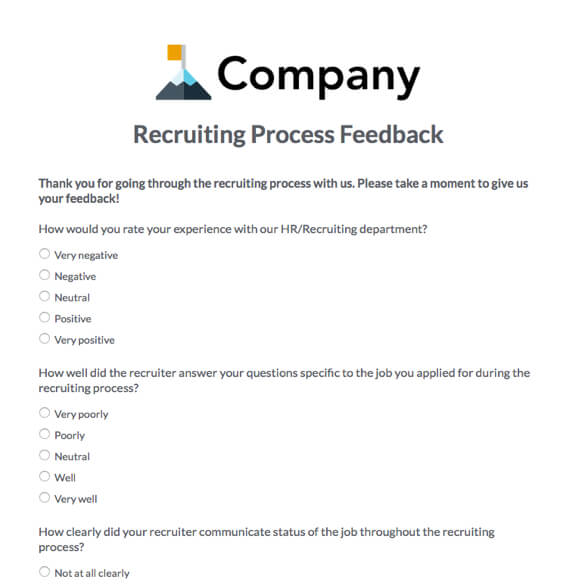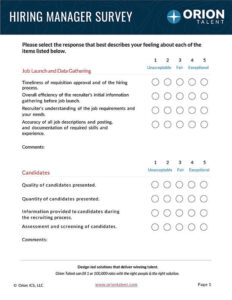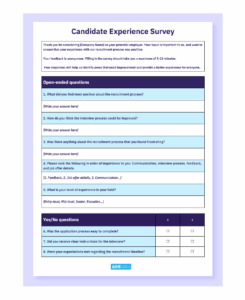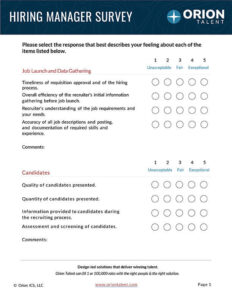In today’s competitive talent landscape, attracting and retaining top talent goes far beyond just posting a job and waiting for applications. It is about crafting an experience that leaves a lasting positive impression, whether a candidate is hired or not. Every interaction, from the initial application to the final decision, contributes to your employer brand and impacts future recruitment efforts. Gathering insights into this journey is absolutely critical for continuous improvement.
Understanding what works well and what needs refinement in your hiring pipeline isn’t just a nice-to-have; it’s a strategic imperative. That’s where a well-designed feedback mechanism comes into play. By systematically collecting opinions from candidates, hiring managers, and interviewers, you can pinpoint bottlenecks, improve communication, and ultimately enhance the overall candidate experience. This proactive approach ensures your recruitment process is not just efficient, but also highly effective and reflective of your company’s values.

Why Your Recruitment Process Needs Feedback
Think about it: every candidate who interacts with your company, whether they get the job or not, becomes an ambassador for your brand. If their experience is positive, they are more likely to recommend your company to others, even if they weren’t selected. Conversely, a negative experience can lead to widespread dissatisfaction, potentially damaging your reputation and making it harder to attract quality applicants in the future. Feedback surveys provide a direct line to understanding these experiences.
Beyond just reputation, feedback helps uncover inefficiencies and pain points within your hiring funnel. Perhaps candidates find the application too long, or maybe there are delays in communication after interviews. These are issues that, if left unaddressed, can lead to top talent dropping out of your pipeline and choosing a competitor instead. A systematic approach to gathering feedback allows you to identify these areas and implement targeted improvements.
Moreover, feedback isn’t just for candidates. It is equally valuable to collect insights from your internal stakeholders. How are hiring managers finding the process? Are interviewers clear on their roles and responsibilities? Are the tools and systems supporting your recruitment team effectively? Understanding these internal perspectives is crucial for optimizing workflows and ensuring everyone involved is aligned and supported.
By regularly soliciting feedback, you transform your recruitment process from a static operation into a dynamic, continuously improving system. It allows you to be agile, adapt to market changes, and consistently refine how you identify, attract, and onboard new team members. This commitment to improvement signals to candidates and employees alike that you value their time and experience.
Types of Feedback to Gather
- Candidate Experience: Insights on the application process, interview stages, communication, and overall perception of the company.
- Interviewer Experience: Feedback from interviewers on candidate quality, the clarity of job requirements, and the effectiveness of interview guides.
- Hiring Manager Satisfaction: Data on the support received from the recruitment team, candidate quality, and timeliness of the hiring process.
- Process Efficiency: Opinions on the duration of the process, ease of scheduling, and administrative burdens.
Crafting an Effective Recruitment Process Feedback Survey Template
Designing a survey that truly captures meaningful insights requires careful thought. It needs to be clear, concise, and easy to complete, encouraging honest and comprehensive responses without becoming a burden. Start by defining your objectives: what specific aspects of the recruitment process do you want to evaluate? Is it communication, the interview experience, the fairness of the process, or all of the above? A well-structured recruitment process feedback survey template will address these points methodically.
Consider the timing of your survey. For candidates, sending it out shortly after they’ve completed their final interview or received a decision (whether an offer or a rejection) is usually best. Their experience will be fresh in their minds, leading to more accurate and detailed responses. For internal stakeholders like hiring managers and interviewers, surveying them after a role has been filled, or periodically throughout the year, can provide valuable perspective.
The questions themselves should be a mix of rating scales (e.g., 1-5 for satisfaction) and open-ended questions. Rating scales provide quantifiable data that can be easily tracked over time, while open-ended questions offer richer, qualitative insights that explain the “why” behind the ratings. Avoid leading questions and keep the language neutral and professional. Focus on actionable feedback that can directly inform improvements.
Most importantly, once you have collected the feedback, make sure you act on it. A survey is only as valuable as the changes it inspires. Analyze the data regularly, identify trends and common themes, and prioritize areas for improvement. Share the findings with relevant teams and develop action plans to address weaknesses. This demonstrates to everyone, both internally and externally, that their feedback is valued and contributes to a better experience.
- How easy was it to find and apply for the position? (1-5 scale)
- Was the job description clear and accurate? (Yes/No/N/A)
- How would you rate the communication from our recruitment team? (1-5 scale)
- Did you feel the interview process allowed you to fully showcase your skills and experience? (Yes/No, with an optional text box)
- What was the most positive aspect of your experience? (Open-ended)
- What, if anything, could we improve about our recruitment process? (Open-ended)
- Would you recommend applying for a role at our company to a friend or colleague? (Yes/No/Maybe)
By consistently gathering and acting upon feedback, you empower your organization to build a hiring process that not only attracts the best talent but also leaves every candidate with a positive perception of your brand. This continuous loop of improvement solidifies your reputation as an employer of choice and contributes significantly to your long-term success.
Ultimately, investing in a robust feedback system for your recruitment efforts is an investment in your company’s future. It ensures that your talent acquisition strategies remain sharp, responsive, and effective in a constantly evolving job market. This proactive approach to refining your processes will undoubtedly set you apart, fostering both a stronger employer brand and a more efficient hiring machine.



